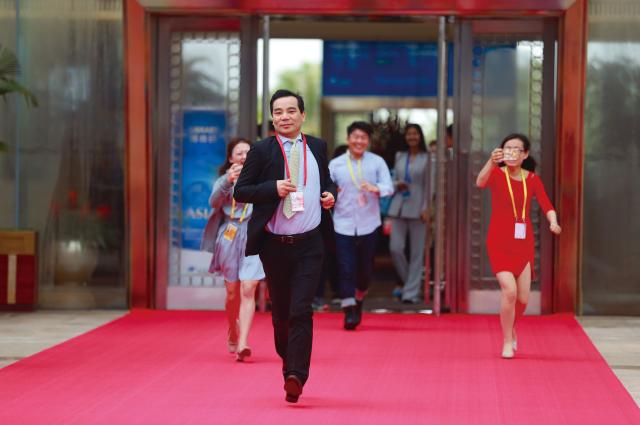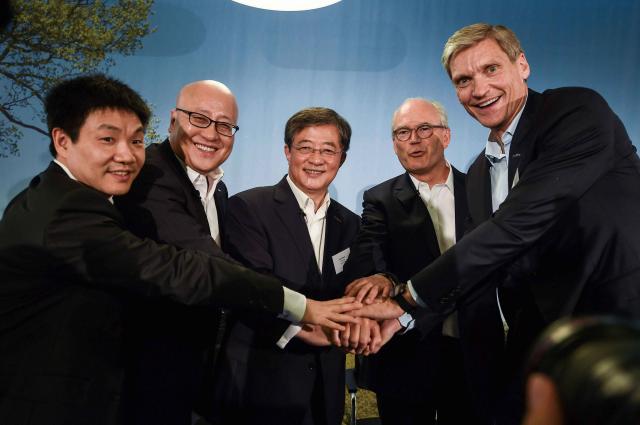China stepped up scrutiny of capital outflows while the yuan was facing depreciation pressures.
But other considerations have also underwritten the government’s moves, and investors’ incentives
Giant Wanda Plazas are a fixture in many Chinese cities. Consumers go there to shop, watch movies and play games. In the past few years, their owner and operator, Beijing-based Wanda Group, has become a big shopper itself – on the international market. “The year 2016 saw Wanda’s greatest number of overseas acquisitions in our [28 years of] history, contributing to the growth in scale and net profit,” Wang Jianlin, Wanda’s chairman told his staff at a company meeting in January 2017. Wang was named China���s richest person by Forbes for the years 2013, 2015 and 2016 (in 2014 he was beaten by Alibaba Group founder Jack Ma). In Wang’s speech, which was published on the company’s website, he praised a buy-out of Odeon & UCI Cinemas and Carmike Cinemas by Kansas-based company AMC, which was acquired by Wanda in 2012 and listed on the New York Stock Exchange in 2013. He declared that Wanda would continue its overseas ventures in 2017 through more acquisitions, as well as through progress on theme park and luxury hotel projects inked in 2016.
Wanda is not the only Chinese company on an overseas shopping spree. Chinese companies have been eager to go global since the aftermath of the 2008 Global Financial Crisis. They made a record high level of outbound foreign direct investment (FDI) in 2015, eclipsing China’s inbound foreign direct investment for the first time. They set an even higher record in 2016, according to China’s Ministry of Commerce.
However, there are questions over whether some of the deals will be delivered, and whether China can consolidate its position on outbound FDI in 2017. In a change of tune, Wang Jianlin recently told reporters that he would “focus on domestic investment” in response to the “call of our country.” For the past few months, Wanda has been dogged by speculation that it was instead the call of regulators that had restricted it from moving money, or even its chairman, abroad. It has announced it would sue Chinese language media in China and the US for starting what it called “malicious rumors,” which dipped the value of its shares and bond prices at home and abroad.
But it has been confirmed that China’s Banking Regulatory Commission was scrutinizing the financial positions of companies engaging in aggressive overseas acquisitions. It is also true that the Chinese government has been tightening capital outflows to defend the yuan’s value from a sharp depreciation against the US dollar over the past two years. Since the end of 2016, senior officials with several ministries repeatedly warned against “irrational overseas investment” by Chinese companies. On August 18, the State Council issued a guideline that restricts overseas investment in “real estate, hotels, cinemas, entertainment and sports clubs,” all of which were on the shopping list of Wanda and other giants.
Reading Between the Lines
In an article in for the May issue of Modern Bankers, a Chinese journal, People’s Bank of China (PBOC) deputy head Pan Gongsheng, who also heads the State Administration of Foreign Exchange (SAFE), concluded that capital flows in and out of China resonate with international capital flows. Between 2000 and 2014, China took in much more foreign direct and portfolio investment than it made in outbound investments. Internationally, capital from developed markets sought higher returns in emerging markets with faster economic growth during this period. However, in 2014, China’s non-reserve capital and financial accounts, which reflect cross-border investment, recorded deficits between the second and fourth quarter, and the surplus for the whole year was down 89 percent on 2013. In 2015, 2016 and the first quarter of 2017, the deficit of China’s non-reserve capital and financial accounts, a sign of net capital outflow, had exceeded the country’s trade surplus, according to the SAFE. Internationally, an economic slowdown in emerging markets and the US Federal Reserve’s tapering of quantitative easing, followed by its benchmark interest rate hike, drove capital back to developed markets, particularly the US.
Some capital flows cannot be tracked to particular investors, and are recorded as “net errors and omissions” as an “offset to the overstatement or understatement” of other entries, according to the IMF. Theoretically and practically, these are attributed to technical factors – statistical methodology and the changing value of existing overseas assets. But in China’s case there has long been controversy over whether the entry might be explained by risky short-term cross-border capital flows, hot money seeking short-term returns in response to fluctuations in the value of the yuan. That debate has been reignited recently. Professors Yu Yongding and Xiao Lisheng, both of the Chinese Academy of Social Sciences, have repeatedly argued China’s record of this entry has not only stayed much greater than the international standard, but has also followed the movement of the yuan’s foreign exchange rate over the years. They say this signals hot money inflows when the yuan is strong, and outflows when the yuan is weak. As a result, the professors argue China has faced severe capital flight for the past two years. Guan Tao, former director of the Balance of Payments Department at SAFE, disagrees. In an article on China Finance Forum 40 website on August 16, he said labeling this large negative figure over 2015 and 2016 as “capital flight” was a “moral judgment” which made little policy sense. In an interview published September 4, Yu told the China Securities Journal, that capital flight was generally illegal capital outflow in markets with capital controls.
Indeed, China has always been wary of the movement of hot money, which has had a significant impact on the movement of the yuan, and on domestic monetary policy. The country tried to keep hot money off at the time of the yuan’s strong appreciation and tighten capital outflow rules at the time of the yuan’s sharp depreciation. Internationally, it is widely accepted that speculative hot money was one of the major contributors to financial crises that have hit emerging markets from Asia to Latin America.
Despite differences of opinion, there is convergence among Chinese officials and analysts on the reality that China faced severe capital outflows, particularly short-term outflows, in 2015 and 2016, in comparison with the enormous capital inflows in previous years.
There are various means by which Chinese citizens and companies can buy foreign currencies and take their money out of China, both legal and illegal. For example, foreign-funded companies in China take the profits of their China operations back to their home countries. Chinese students and tourists spend money overseas. Chinese investors build factories, or buy assets on overseas markets, including real estate, companies and portfolios. Chinese borrowers repay their foreign debts in US dollars. Criminals launder money. Underground transfer operators squirrel cash offshore. Chinese foreign traders may overinvoice their imports and underinvoice their exports to keep more US dollars at hand. They may also fake import contracts to apply for foreign exchanges at banks. Some Chinese companies use their domestic assets as a guarantee for loans of their overseas financing platforms. Defaulting on these platforms triggers the transfer of domestic guarantees to the overseas banks that have lent them the money.
Even using legal channels, it is often difficult to spot disguised methods of capital flight by circumventing capital control rules. For example, a Chinese citizen is allowed to exchange up to US$50,000 a year in foreign currencies. That is far from enough to buy a house in, say, the US, Canada or the UK. This buyer might ask their family, relatives and friends to buy dollars using their own quotas. The money is then collected and transferred to the overseas account of the buyer. SAFE penned a rule in 2009 to curb this incremental method of transferring money. In September 2015 when the yuan was in a period of sharp depreciation, SAFE required banks to check more carefully transactions that indicate such abuse of quotas, including, for example, frequent remittances by several people to the same overseas account within a certain period of time. In March 2017, SAFE disclosed on its website two cases in which two persons were fined for using this trick. It has also found that some payments made by Chinese tourists during their overseas travels were not for travel expenditure, but financial investment. SAFE revised the figures accordingly. The money involved is huge. A June discussion paper by Anna Wong of the US Board of Governors of the Federal Reserve System says this makes China’s travel deficit 0.9 percent of GDP smaller every year in the period 2014-2016. Since January 2017, Chinese travelers have had to provide more details on their purposes of exchanging foreign currency at banks. SAFE also declared in early August that it would strengthen reviews of offshore borrowing with onshore guarantees.

Anomalies in overseas investment by Chinese companies have attracted more attention from regulators since the end of 2016. In November and December of last year, four ministries responsible for foreign investment and foreign exchange made joint statements warning against “irrational outbound investment” in real estate, hotels, cinemas, entertainment and sport clubs, the five sectors that have been on the State Council’s recent restriction list. Other risks involving overseas expansions included deals where companies invested significantly in sectors outside their core business, acquired offshore operations much bigger than their onshore parent companies and launched aggressive overseas expansions immediately after they set up onshore. The ministries said companies applying for approval of large overseas investments would be put under stricter scrutiny on the incentives and compliance of their behaviors.
Regulators say some of these deals have murky incentives and dubious prospects. In his speech at the China Development Forum in Beijing on March 20, Pan Gongsheng questioned the acquisition of foreign food companies by Chinese steel makers, and foreign online game developers by Chinese catering operators. “Many companies have borrowed a lot for their overseas acquisitions, despite their already high debt ratios. Some just use overseas investments as a surreptitious way of transferring assets,” Pan was quoted as saying by China Securities Journal. In his article in May, he described overseas investment as a “thorny rose” which looks beautiful but could hurt if not handled carefully.

In June and August 2016, two Chinese companies bought controlling stakes in two iconic Italian soccer clubs, Inter Milan and AC Milan. The first buyer was Suning, a Chinese retail group, and the second was a new company founded just a few months earlier. Inter Milan has been hemorrhaging money for several years, and AC Milan was heavily in debt when the agreements were reached. Besides Wanda, Anbang, an insurer, Hainan Airlines and Fosun Group made diverse mega-deals, including real estate and hotels. Their financial positions have been repeatedly questioned by the media. In an interview with China’s State broadcaster China Central Television on July 18, Ying Zhongli, a finance and banking expert at the Chinese Academy of Social Sciences said the main concern was that once their overseas operations failed, the money they had borrowed from banks for these acquisitions would sour, risking the financial security of the Chinese state.
Guan Tao has explained in his “no moral judgement” argument that it is much more feasible to focus on recorded, traceable capital outflows through trade and direct investment, than to focus on unknown deals under the “net errors and emissions” entry, in efforts to curb capital flight. Data from China’s Ministry of Commerce shows that China’s overseas investment was down 46 percent year on year in the first half of the year. The decrease hit 82 percent in the real estate sector, and 83 percent in the cultural, sport and entertainment sector. This has been attributed to efforts to curb “irrational overseas investment,” as well as improved domestic business opportunities and growing vigilance against Chinese bidders on the overseas markets.
Concerns and Controversies
There are other reasons why China may have tightened supervision of outbound FDI. Officials with the Commerce Ministry, SAFE and the National Development and Reform Commission have repeatedly stressed since the end of 2016 that “irrational overseas investment” in those five sectors would not contribute to China’s industrial development. They have made clear that investment in the so-called real economy, such as in infrastructure, high-end manufacturing and resources, and in Belt and Road markets, would be encouraged. The Ministry of Commerce disclosed recently that the decline in overseas investment in those areas was slight.
The Rhodium Group, a US consultancy, also found that Chinese companies’ mergers and acquisitions in basic materials, energy and high-tech industry were more “resilient” after stricter scrutiny. “Private firms still seem to be better able get government approval for outbound transactions that boost their innovation capacity (or those that are in line with Beijing’s industrial policy goals),” it said in a June report.
Li Qin, a Chinese lawyer at an Indian law firm in New Dehli, told NewsChina that this year their Chinese clients have successfully completed the acquisition of Indian companies in the electronic and mechanical sector, with no problem paying in foreign currencies. He believes investment in the real economy will not be affected by stricter capital controls.
However, the measures on more scrutiny of overseas investment have aroused concerns over China’s financial openness. Pan Gongsheng stressed in his article that the “open windows would not be closed again.” He said existing channels of two-way securities investment between the Chinese mainland and the overseas markets would remain intact. Guo Song of SAFE’s Capital Account Management Department reiterated in an article for Caixin on August 24 that policies issued in recent years to streamline the process by which Chinese companies applied for foreign exchanges would not change. The principle was to find a balance between investment facilitation and risk prevention, he said.
Meanwhile, Professor Yu has been advocating a floating exchange rate system which would leave the value of the yuan fully up to market forces. As the world’s second largest economy, China is in a better economic and financial position than any other country to adopt the floating exchange rate system, Yu says. He believes recent improvements in China’s economic growth, international payments and expectation for the yuan have combined to deliver a good opportunity for China to do so. While agreeing that stricter scrutiny over cross-border mega-deals is necessary and effective, he said stricter controls were a “double edged sword” which made normal transactions more complex than usual. He stressed that a floating system was a much better choice than capital controls to affect capital flows.

There is still strong enthusiasm among Chinese investors to go abroad. Wu Pengfei, a young man who recently co-founded a private equity company in Beijing, told NewsChina he was looking forward to trading on the Indian stock market, which had been booming for several years. He said his potential clients would be Chinese investors seeking good returns on their money in offshore accounts. The Rhodium Group found Chinese overseas investment rebounded in May and June after a sharp fall in the first quarter of the year.
Like the reasons for the Chinese government to strengthen the scrutiny of capital outflows, incentives for Chinese investors to go abroad are diverse. They are tapping more and better business opportunities, or building international brands. Besides, barriers to private investment, including limited market access and difficulty winning financing, have yet to be addressed to fulfill the government’s commitment to stabilize the expectations of entrepreneurs for investing more on the home market. The central bank has also repeatedly recognized that “economic fundamentals” are the key to the currency’s value.
Given this, the strict scrutiny over outbound FDI is not likely to be relaxed even after the yuan has rebounded robustly this year. But stricter scrutiny cannot shape investors’ confidence in the yuan’s value, or in the market. A better business environment is more important.

 Old Version
Old Version


